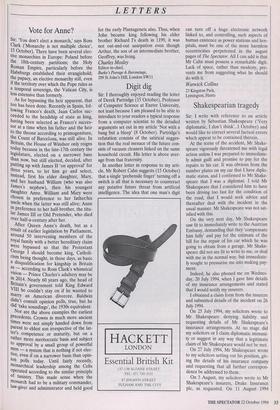LETTERS Vote for Anne?
Sir: 'You don't elect a monarch,' says Ross Clark (Monarchy is not multiple choice', 15 October). There have been several elec- tive monarchies in Europe: Poland before the 18th-century partitions; the Holy Roman Empire, particularly before the liabsburgs established their stranglehold; the papacy, an elective monarchy still, even if the territory over which the Pope rules as a temporal sovereign, the Vatican City, is less extensive than formerly. As for bypassing the heir apparent, that too has been done. Recently in Spain, fol- lowing Franco's death, Juan Carlos suc- ceeded to the headship of state as king, having been selected as Franco's succes- sor at a time when his father and the heir to the throne according to primogeniture, the Count of Barcelona, was still alive. In Britain, the House of Windsor only reigns today because in the late-17th century the legislature, elected on a narrower base than now, but still elected, decided, after putting up with James II 'on approval' for three years, to let him go and select, instead, first his elder daughter, Mary, and her husband William (who was also James's nephew), then his youngest daughter Anne. William and Mary were chosen in preference to her father/his uncle when the latter was still alive; Anne in preference to her half-brother, the titu- lar James III or Old Pretender, who died over half-a-century after her. After Queen Anne's death, but as a result of earlier legislation by Parliament, around 50 intervening members of the royal family with a better hereditary claim were bypassed so that the Protestant George I should become king, Catholi- cism being thought, in those days, as basic a disqualification for kingship in Britain as — according to Ross Clark's whimsical vision — Prince Charles's adultery may be in 2014. Nearly 60 years ago, the head of Britain's government told King Edward VIII he couldn't stay on if he wanted to marry an American divorcee. Baldwin didn't consult opinion polls, true, but he did 'take soundings', the 1930s equivalent. Nor are the above examples the earliest precedents. Crowns in much more ancient tunes were not simply handed down from parent to eldest son irrespective of the lat- ter's competence or maturity, but on a rather more meritocratic basis and subject to approval by a small group of powerful men — a system that is nothing if not elec- tive, even if on a narrower basis than opin- ion polls today. Until fairly recently, monarchical leadership among the Celts operated according to the similar principle of tanistry. This made sense when the monarch had to be a military commander, law-giver and administrator and held good for the early Plantagenets also. Thus, when John became king following his elder brother Richard I's death in 1199, it was not out-and-out usurpation even though Arthur, the son of an intermediate brother, Geoffrey, was living.
Charles Mosley
Editor-in-chief, Burke's Peerage & Baronetage, 209 St John's Hill, London SW11










































































 Previous page
Previous page